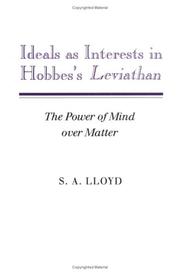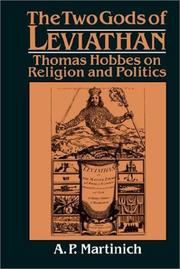| Listing 1 - 2 of 2 |
Sort by
|

ISBN: 0521392438 0521522323 0511611978 0511002203 9780521392433 9780511002205 9780521522328 Year: 1992 Publisher: Cambridge : Cambridge University Press,
Abstract | Keywords | Export | Availability | Bookmark
 Loading...
Loading...Choose an application
- Reference Manager
- EndNote
- RefWorks (Direct export to RefWorks)
S. A. Lloyd proposes a radically new interpretation of Hobbes's Leviathan that shows transcendent interests - interests that override the fear of death - to be crucial to both Hobbes's analysis of social disorder and his proposed remedy to it. Most previous commentators in the analytic philosophical tradition have argued that Hobbes thought that credible threats of physical force could be sufficient to deter people from political insurrection. Professor Lloyd convincingly shows that because Hobbes took the transcendence of religious and moral interests seriously, he never believed that mere physical force could ensure social order. Lloyd's interpretation demonstrates the ineliminability of that half of Leviathan devoted to religion, and attributes to Hobbes a much more plausible conception of human nature than the narrow psychological egoism traditionally attributed to Hobbes.
Hobbes, Thomas, --- Contributions in political science --- Contributions in political stability --- Contributions in social conflict --- Hobbes, Thomas --- -Hobbes, Thomas --- -Contributions in political stability --- Contributions in philosophy of political science --- Hobbes, Thomas, 1588-1679. Leviathan. --- Hobbes, Thomas, 1588-1679 - Contributions in political science.. --- Hobbes, Thomas, 1588-1679 - Contributions in political stability. --- Hobbes, Thomas, 1588-1679 - Contributions in social conflict. --- Arts and Humanities --- Philosophy --- Hobbes, Thomas, - 1588-1679. - Leviathan --- Hobbes, Thomas, - 1588-1679 - Contributions in political science --- Hobbes, Thomas, - 1588-1679 - Contributions in political stability --- Hobbes, Thomas, - 1588-1679 - Contributions in social conflict --- Hobbes, Thomas, - 1588-1679

ISBN: 0521531233 0521418496 0511624816 0511880952 Year: 1992 Publisher: Cambridge : Cambridge University Press,
Abstract | Keywords | Export | Availability | Bookmark
 Loading...
Loading...Choose an application
- Reference Manager
- EndNote
- RefWorks (Direct export to RefWorks)
As well as being considered the greatest English political philosopher, Hobbes has traditionally been thought of as a purely secular thinker, highly critical of all religion. In this provocative new study, Professor Martinich argues that conventional wisdom has been misled. In fact, he shows that religious concerns pervade Leviathan and that Hobbes was really intent on providing a rational defense of the Calvinistic Church of England that flourished under the reign of James I. Professor Martinich presents a close reading of Leviathan in which he shows that, for Hobbes, Christian doctrine is not politically destabilizing and is consistent with modern science.
-Contributions in natural law --- Hobbes, Thomas, --- Religion. --- Hobbes, Thomas --- Contributions in philosophy of political science --- Contributions in natural law --- Religion --- Hobbes, Thomas, 1588-1679. Leviathan. --- Hobbes, Thomas, 1588-1679 - Contributions in political science. --- Hobbes, Thomas, 1588-1679 - Contributions in natural law. --- Hobbes, Thomas, 1588-1679 - Religion. --- Gobbs, Tomas, --- Hobbs, Thomas, --- Gobbes, Tomas, --- T. H. --- H., T. --- Hobs, Thomas, --- Hobbes, --- Hobbes, Thom. --- Hobbius, Thomas, --- Hobbuzu, Tomasu, --- Huobusi, --- Hobbs, Tho. --- הובס, תומס, --- 霍布斯, --- ホッブズ, トマス, --- Arts and Humanities --- Philosophy
| Listing 1 - 2 of 2 |
Sort by
|

 Search
Search Feedback
Feedback About
About Help
Help News
News